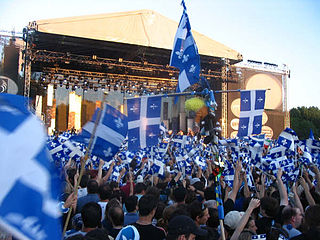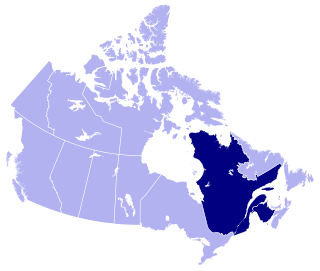Related Research Articles

Gabrielle Roy was a Canadian author from St. Boniface, Manitoba and one of the major figures in French Canadian literature.

Franco-Ontarians are Francophone Canadians that reside in the province of Ontario. Most are French Canadians from Ontario. In 2016, the Government of Ontario calculated that there are approximately 622,415 francophones residing in the province. The majority of Franco-Ontarians in the province reside in Eastern Ontario, Northeastern Ontario, and Central Ontario, although small francophone communities may be found in other regions of the province.

Quebec nationalism or Québécois nationalism is a feeling and a political doctrine that prioritizes cultural belonging to, the defence of the interests of, and the recognition of the political legitimacy of the Québécois nation. It has been a movement and a central issue in Quebec politics since the beginning of the 19th century. Québécois nationalism has seen several political, ideological and partisan variations and incarnations over the years.

Quebec comics are French language comics produced primarily in the Canadian province of Quebec, and read both within and outside Canada, particularly in French-speaking Europe.
TVA is a Canadian French-language terrestrial television network, owned by Groupe TVA, a publicly traded subsidiary of Quebecor Media.

French is the mother tongue of approximately 7.2 million Canadians according to the 2016 Canadian Census. Most Canadian native speakers of French live in Quebec, the only province where French is the majority language and the only province in which it is the sole official language. Of Quebec's people, 71.2 percent are native francophones and 95 percent speak French as their first or second language.

Gay Village is a neighbourhood delineated by Saint Catherine Street East and Atateken Street in the Ville-Marie borough of Montreal, Quebec, Canada.

The ArQuives: Canada's LGBTQ2+ Archives, formerly known as the Canadian Lesbian and Gay Archives, is a Canadian non-profit organization, founded in 1973 as the Canadian Gay Liberation Movement Archives. The ArQuives acquires, preserves, and provides public access to material and information by and about lesbian, gay, bisexual, transgender, queer, and two-spirit communities primarily in Canada.
Anti-Quebec sentiment is a form of prejudice which is expressed toward the government, culture, and/or the francophone people of Quebec. This prejudice must be distinguished from legitimate criticism of Quebec society or the Government of Quebec, though the question of what qualifies as legitimate criticism and mere prejudice is itself controversial. Some critics argue that allegations of Quebec bashing are sometimes used to deflect legitimate criticism of Quebec society, government, or public policies.

AIDES is a French community-based non-profit organisation that was founded in 1984 by Daniel Defert, following the death, from HIV/AIDS, of his partner Michel Foucault. The name is a play on "aides" and the English acronym "AIDS".
Marcel Dubé was a Canadian playwright. He produced over 300 works for radio, television, and stage. During his career he promoted the preservation and sanctity of the French language in Quebec.

Météo+ is a Canadian television sitcom which aired on TFO, the French language public broadcaster in Ontario, from February 14, 2008 to April 28, 2011. The series is about the colourful crew of Météo+, a fictional francophone weather channel for the Northeastern Ontario region based in Sudbury.
Gilles Marchildon is a Canadian francophone activist and LGBT activist currently living in Toronto. He is currently Toronto campus director for Collège Boréal. Prior to that, he worked in the field of health as executive director of the French-language health planning agency Reflet Salvéo from 2014 to 2019 and previously, from 2010 to 2014, as executive director of the community health agency Action Positive VIH/SIDA. He was president of ACFO Toronto and also vice-chair of the City of Toronto's French Language Advisory Committee. He continues to serve on Toronto's Advisory Committee on Seniors Services and Long-Term Care. He also sits on the board of the provincial community foundation, la Fondation Franco-ontarienne, where he was elected president.

New England French is a variety of French spoken in the New England region of the United States. It descends from Canadian French because it originally came from French Canadians who immigrated to New England during the Grande Hémorragie.
Quebecers or Quebeckers are people associated with Quebec. The term is most often used in reference to descendants of the French settlers in Quebec but it can also be used to describe people of any ethnicity who live in the province.

Carole Fréchette is a Canadian playwright. She won the Siminovitch Prize in 2002. To date she has written more than a dozen plays including The Four Lives of Marie, The Seven Days of Simon Labrosse, Helen's Necklace, John and Beatrice, The Little Room at the Top of the Stairs, and most recently: Thinking of Yu.

Jovette Marchessault was a Canadian writer and artist from Quebec, who worked in a variety of literary and artistic domains including novels, poetry, drama, painting and sculpture. An important pioneer of lesbian and feminist literature and art in Canada, many of her most noted works were inspired by other real-life women in literature and art, including Violette Leduc, Gertrude Stein and Alice B. Toklas, Emily Carr, Anaïs Nin and Helena Blavatsky.
Paul Gagné is a Canadian literary translator currently working in Montreal, Quebec, Canada. With his wife Lori Saint-Martin, he has translated over seventy English language books into French, including the works of authors such as Maya Angelou, Margaret Atwood and Naomi Klein. He holds a master's degree in French literature from Laval University.
Bernard Lachance was a Canadian singer-songwriter.

The 2018 Franco-Ontarian Black Thursday occurred on 15 November 2018, when the government of Ontario, led by Doug Ford, announced a number of cuts to Franco-Ontarian institutions in the province, notably the elimination of the office of the French Language Services Commissioner and of the soon-to-be-opened Université de l'Ontario français. The cuts provoked a significant backlash from the Franco-Ontarian community, leading to the largest mass mobilisations in Franco-Ontarian history, surpassing those of SOS Montfort two decades earlier, and leading to the government of Ontario mostly backing down from the cuts.
References
- 1 2 3 4 5 6 7 Jones, Bruce (2003). "Bernard Courte (1949-1991)". digitalexhibitions.arquives.ca. Retrieved 2021-03-16.
- ↑ "AGQ-F0011". Archives gaies du Québec (in Canadian French). Retrieved 2021-04-07.
- ↑ Aldrich, Robert; Wotherspoon, Garry (2002). Who's who in Contemporary Gay and Lesbian History: From World War II to the Present Day. Psychology Press. ISBN 978-0-415-29161-3.
- 1 2 3 4 5 6 7 8 9 10 11 12 13 "Bernard Courte - Archeion". www.archeion.ca. Retrieved 2021-03-16.